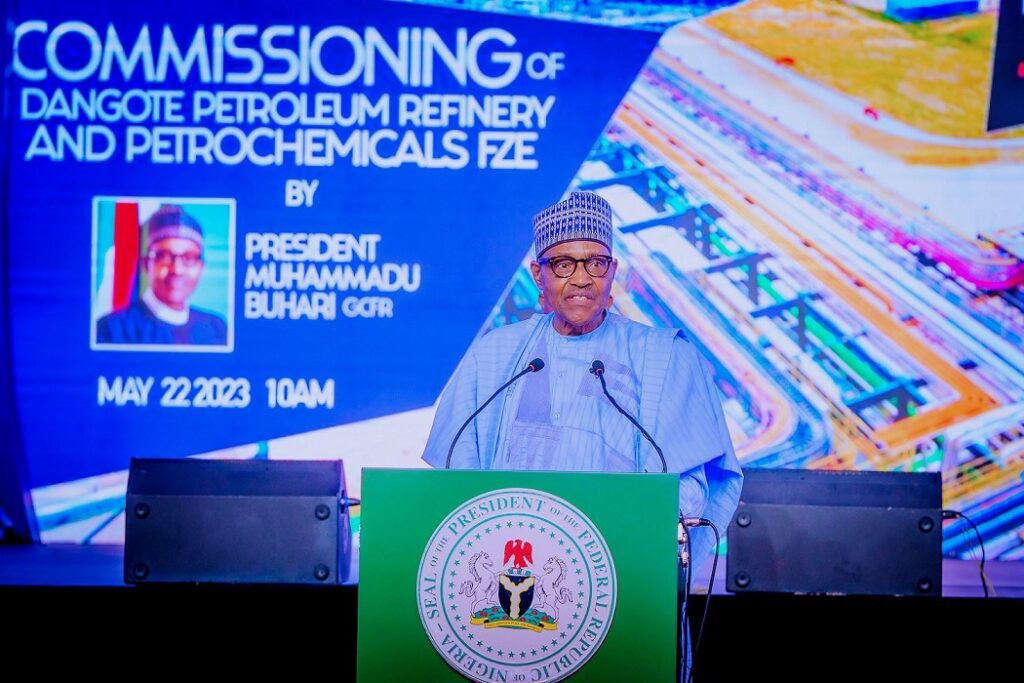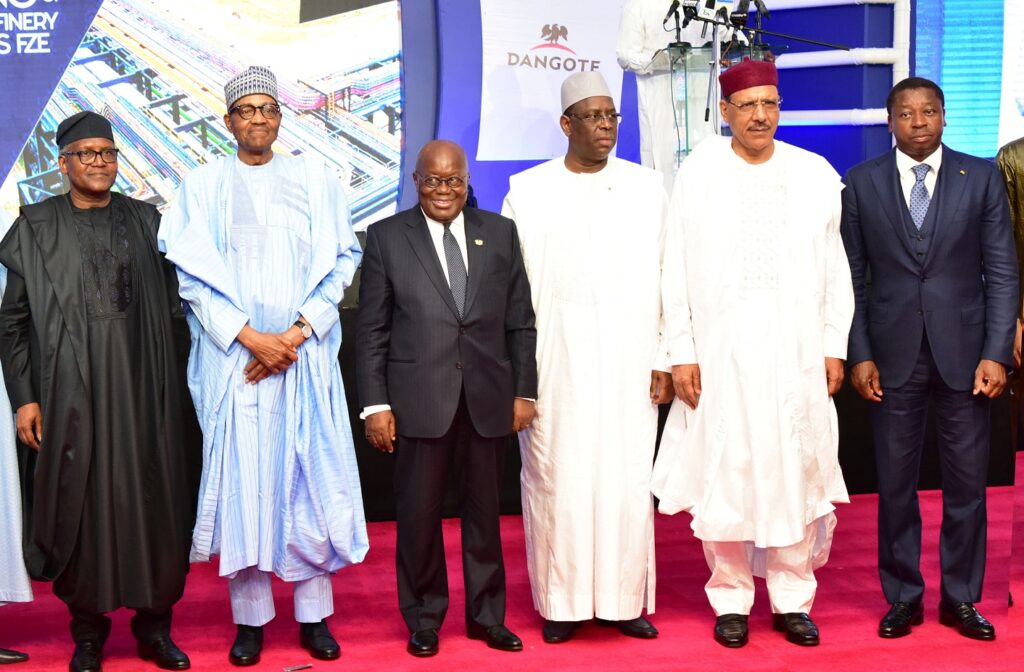A landmark event in the industrialisation of Africa took place on Monday, when the continent’s largest oil refinery was commissioned in Lagos.
Witnessed by five African heads of states, the opening of Dangote Petroleum Refinery and Petrochemicals is being greeted continent wide as another evidence that things are looking up for African development.
Built by Africa’s richest man, Aliko Dangote, the massive complex is Nigeria’s single largest investment – complete with a 435-megawatt power station, a deep seaport and a fertilizer unit.
Built at the cost of US$19 billion, the Dangote Refinery is expected to have the capacity to process about 650,000 barrels per day of crude oil when in full operation.

President Buhari delivers his speech at the commissioning ceremony on Monday/Photo: Nigerian Presidency
The inauguration of the refinery comes with high expectations for the Nigerian government and people. Even though it exports crude oil, Nigeria is a net importer of refined petroleum products. It spent $23.3bn last year on petroleum product imports, which are sold at subsidised prices to the public.
The amount the government spends on this subsidy is the biggest item on the annual national budget. Subsidy payments amounted to N4.39 trillion (about $10 bn) in 2022.
It’s now expected that when in full operation the Dangote Refinery will fully meet national demand for petroleum products and even have surplus for export to the sub-region.

The massive refining and petrochemical complex, said to be the world’s largest single-train refinery, also has a 435-megawatt power station, a deep seaport and a fertiliser unit/Photo: Dangote Industries
Hence, the government had pinned its hopes of ending fuel imports subsidy largely on the completion of the Dangote Refinery, which was officially commissioned on Monday by President Muhammadu Buhari in the presence of his counterparts from the region – Faure Gnassingbé of Togo; Macky Sall of Senegal; Mohamed Bazoum (Niger Republic); and Ghana’s Nana Akufo-Addo.
Speaking at the commissioning ceremony, Alhaji Aliko Dangote said the priority of the plant was to fully satisfy Nigerian demand and eliminate “the tragedy of import dependency”.
The International Monetary Fund (IMF) has projected that the Dangote Refinery would help Nigeria’s economic recovery drive when it starts production in June or July.
“With crude oil for local refining not subject to the Organisation of Petroleum Exporting Countries (OPEC) quota, the refinery also has the potential to catalyse more domestic crude oil production and boost gross domestic product (GDP),” IMF said.

From left: Alhaji Aliko Dangote, owner of the refinery, and Presidents Muhammadu Buhari of Nigeria, Nana Akufo-Addo (Ghana), Macky Sall (Senegal), Mohamed Bazoum (Niger Republic) and Faure Gnassingbé (Togo) at the commissioning ceremony/Photo: Dangote Industries
In fact, by the time the Dangote Refinery reaches full operation and state-owned refineries that are currently being rehabilitated are also back in full production, Nigeria could become Africa’s biggest refining hub by 2025, say analysts.
The Director-general of the Lagos Chamber of Commerce and Industry (LCCI), Chinyere Almona, said the refinery would save and generate foreign exchange, create jobs, positively affect the value of the naira, broaden prosperity for the downstream sector and provide growth opportunities for businesses.
“The LCCI views the refinery’s impact on the Nigerian economy as significant. It will also stimulate economic growth by impacting the country’s balance of payments,” she said.
“In addition, the Chamber expects the refinery to fuel further growth and development across its value chain, including cosmetics, plastics, textiles etc,” she added.
The Dangote Group, in a statement Saturday on Twitter, said the refinery will be churning out Premium Motor Spirit (PMS), diesel (AGO), aviation jet fuel and Dual-Purpose Kerosene (DPK), among other refined products.
Femi Awoniyi
 THE AFRICAN COURIER. Reporting Africa and its Diaspora! The African Courier is an international magazine published in Germany to report on Africa and the Diaspora African experience. The first issue of the bimonthly magazine appeared on the newsstands on 15 February 1998. The African Courier is a communication forum for European-African political, economic and cultural exchanges, and a voice for Africa in Europe.
THE AFRICAN COURIER. Reporting Africa and its Diaspora! The African Courier is an international magazine published in Germany to report on Africa and the Diaspora African experience. The first issue of the bimonthly magazine appeared on the newsstands on 15 February 1998. The African Courier is a communication forum for European-African political, economic and cultural exchanges, and a voice for Africa in Europe.


























